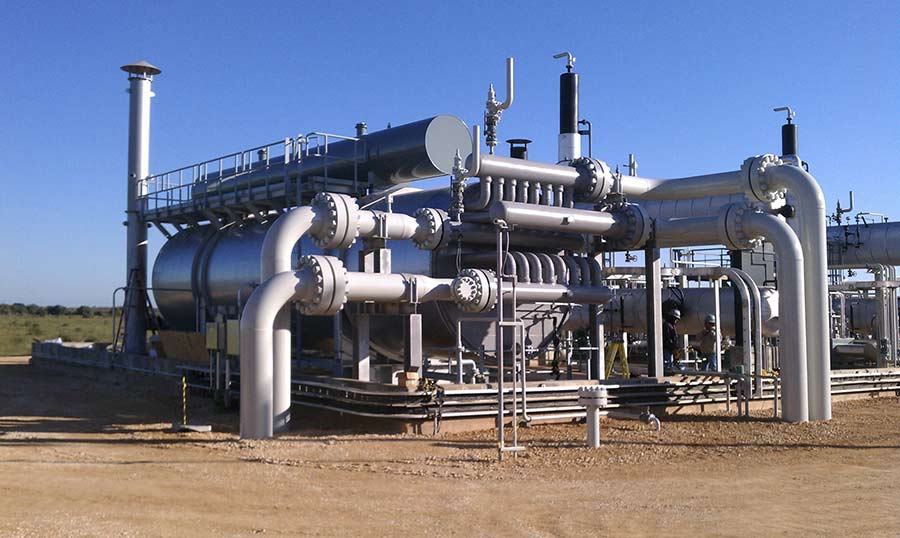Fuel Gas Conditioning for Combustion Turbines

The performance and longevity of an industrial or aeroderivative turbine rely heavily on the quality of the liquid or gaseous fuel employed. Inferior fuel can affect the turbine’s reliability, structural integrity, and ability to comply with local, state, and federal emission standards. With these considerations in mind, ensuring fuel gas is properly treated to remove impurities is vital for any turbine or combustion turbine operation.
What Is Fuel Gas Conditioning?
Fuel gas conditioning is the method by which fuel is filtered to remove impurities and readied for use in combustion systems. Both liquid and gaseous fuels must be conditioned to ensure that all contaminants are removed. Unchecked, impurities in fuel can compromise the system, resulting in damage, failure, or inadequate performance.
Solid, liquid, and gaseous contaminants can be found in fuel gas, and all have a tangible effect on the performance of the combustion system. These are introduced into the natural gas supply during mining, transportation, and production, and include:
- Calcium carbonate
- Construction debris
- Gas hydrates and ice
- Glycols from dehydration processes
- Iron sulfate, iron, and copper sulfide
- Lubricating oil, wet scrubber oil, crude oil, and hydrocarbon liquids
- Rust
- Sand and clay
- Water and saltwater
With appropriate treatment, these contaminants can be removed from the fuel prior to injection into a combustion system. The initial fuel gas conditioning process removes solid and liquid impurities through the use of an efficient coalescing filter. Once the solids and liquids have been removed, the fuel gas is superheated using fired or electric heating equipment. Superheating, or dew point heating, increases the gas to a temperature above the hydrocarbon dew point to prevent liquid hydrocarbons from forming in the fuel.
When Is Fuel Gas Conditioning Used?
In addition to being used for the removal of contaminants, fuel gas conditioning can be used to ensure the fuel has the appropriate chemical makeup and consistency for use in gas turbines, for both operational and warranty purposes.
Chemical Composition
Depending on the system, manufacturers may specify a Methane number or Lower Heating Value requirement for fuel used in their equipment, and the fuel must be treated accordingly. In some cases, a fuel gas source may be too rich, and heavy hydrocarbons must be removed to make the fuel compatible with the combustion system.
Moisture & Hydrocarbon Liquids
The reduction of pressure when fuel gas is transported from primary pipelines to the combustion turbine can reduce the temperature of the fuel below its hydrocarbon dew point. This temperature drop allows both moisture and hydrocarbon liquids to collect and contaminate the fuel, necessitating the treatment of the fuel prior to its injection into the system to ensure optimal operation.
Dangers of Improper Fuel Gas Conditioning
If fuel gas remains unconditioned or improperly conditioned before being introduced into a combustion unit, the operator risks:
- System blockage
- System or part damage, such as oxidation, corrosion, or thermal erosion
- Increased emissions
- Combustor flameout
- Deterioration of thermal barrier coatings
- Loss of seal segments
If left unchecked, contaminated fuel ultimately results in reduced efficiency, unplanned outages, and non-compliance with safety regulations. Additionally, once low-quality fuel has been introduced into a gas turbine, it is difficult to determine the specific issues that result, as the effects will cascade throughout the system.
Signs You Have Fuel Gas Quality Issues
If you are experiencing the following in your gas turbine(s), you may have gas quality issues:
- High exhaust temperature spread (T5 spread)
- Combustion instability
- Acoustic issues
- Combustor flameouts
- Increases in emission outputs
- Abnormal power outputs
- Visible signs of oxidation, erosion, and abnormal wear in hot end components
- Deposits of yellow sulfur on control elements
- Loss of control of valves
- Freezing or seizing of pressure regulators
Fuel Gas Conditioning from Sigma Thermal
Fuel gas conditioning is critical to the performance and longevity of turbine combustion systems. Ensuring fuel is properly conditioned necessitates the use of quality heating equipment. For assistance finding a fuel gas conditioning solution that meets your needs, contact the experts at Sigma Thermal.






